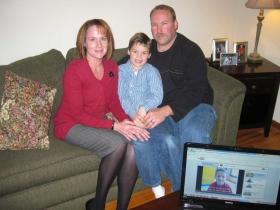Guidance shows improvement in children with PDD
Guidance shows improvement in children with Pervasive Developmental Delay

Guidance shows improvement in children with Pervasive Developmental Delay


Bill was one of those kids. He just loved beating his scores during every visit. He got the idea in his head, that he wanted to reach 1000 bursts before he completed his sessions. Every visit, Bill would request to perform various exercise that he knew he was good at, just to increase his number of bursts so he could reach his goal. Now a kiddo (who happened to have Asperger’s syndrome and ADHD) who has set his mind to something is very difficult to stop!...

Falling Apart at the Seams

A few years ago, she had received a diagnosis of a Sensory Integration disorder, and had attended therapy. Then, when she started school, she was discharged with a good sensory diet, but family let it go by the wayside over time. As symptoms began to emerge again over time, they didn’t think about restarting sensory diet activities, and behavior got out of control in all of her environments. Because the family wanted to try to keep her calm, she got anything she asked for, was able to decide her own bed time, what she ate at every meal and what she got to do during her playtime – which was almost always sitting in front of the computer. Her...

York, PA - Last summer, Julie Sterner broke down in the ice-cream aisle at a grocery store. She couldn't remember what she wanted to buy. The bright lights, people and choices were too much for her mind to handle. She felt overwhelmed and panicked.
"I didn't know how to get out," Sterner said.
In April, the 33-year-old fell in an inflatable bounce house during a Dover Area Senior High School event.
Sterner -- principal at Dover Intermediate School -- hooked up to an elastic cord to race a student. She lay on the inflated floor after she slipped and the band snapped her body backward to the ground. She felt groggy as pain circled her head. She thought she was OK, so she went home and slept. She awoke the next day with a headache and felt fatigued.
“IM not only gave me back my life - it became a part of my life”
Joanne had no idea what was in store for her when her daughter enrolled her grandchildren into one of my IM programs. As the weeks went by and the children started to show dramatic signs of improvement, her daughter’s plan to help her began to unfold. It started with an innocent e-mail “I see how much IM is helping my children, do you think it could help my mother?” - and so the plot began to thicken...
Fastening New Skills with the Interactive Metronome - George’s Story.

As an OT new to the IM program I was interested to see whether the program would help to alleviate the tremor in both of his hands as he tried in vain to manage his fasteners, buttons and zippers when dressing. I knew from experience that helping clients in this area with traditional therapy techniques (repetition/adaptation/compensation) was often arduous, frustrating and time-consuming.
Undaunted, I looked to the fact that the IM program had helped with many of my clients who had motor problems and set out enthusiastically to help George to “fine tune” his fine motor skills.
Developmental Delays in a Pre-teen child

A 12-year-old boy was my first prospect. I had known him and worked with him since he was 18 months old. I reviewed with mom what I had learned, and let her know that I thought this might be a good option for her son who was struggling in school and was very slow and awkward in general. She agreed, knowing that at the very least it would be a good workout for him and that he would have to do some good motor planning during the tasks. She committed to coming in 2x/week before school...

A year ago, Aaron, who was diagnosed at age 5 with attention deficit hyperactivity disorder, had difficulty making eye contact and having a conversation. He couldn’t follow directions and was lagging behind in school by several years.
That began to change last spring after the Davises heard about Interactive Metronome and decided to see if it would help their son. Interactive Metronome is a clinically proven computer-based assessment and treatment tool that has helped children with developmental challenges improve their cognitive, behavioral, social and motor skills.
“We had resigned ourselves that he would live with us and not hold a job or go to college,” Brenda said, as tears spilled down her cheek. “Now, he’s going to go to college, and he’s going to be successful.”
This is one of our most AMAZING success stories involving a TBI patient